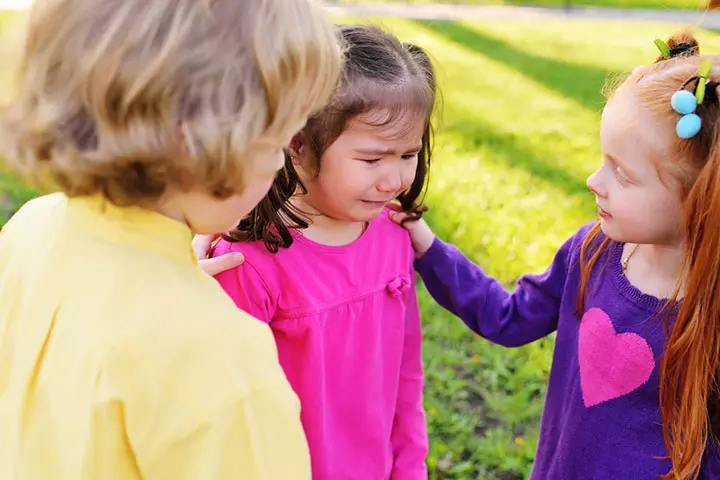
Image: Midjourney/ MomJunction Design Team
Moral values for kids are essential principles that children must learn from early childhood. They are like guidelines that assist a person in choosing between right from wrong or good from bad. Understanding these values is crucial for making honest, credible, and fair decisions in everyday life. Following moral ideals can help children develop a likable character and a pleasant personality. You, as a parent, and your family, play an important role in guiding, supporting, and hand-holding your children in the path of developing moral values. Read on to learn more about the importance of instilling moral principles in children and how you can imbibe them in your child.

Key Pointers
- It is vital for kids to learn moral values.
- Gratitude, honesty, sharing, respect, cooperation, and compassion are some of the most important moral values that a child should have.
- Sharing moral experiences, communicating, and acknowledging good behavior may help inculcate moral values in children.
Importance Of Moral Values In Children
Moral values and ethics are the key components of a person’s character. When taught to a child, they provide the right direction, which helps them develop into responsible individuals. Imbibing moral values in a child will have the following positive effects (1).
- Helps build a positive character with traits such as compassion, respect, kindness, and humility. These may be observed in their willingness to help others, share resources, and communicate effectively with peers.
- Makes the child distinguish between right and wrong or good and bad. It can eventually promote rational thinking and unbiased judgment.
- Provides a perspective that shapes attitudes and beliefs towards various aspects of life.
- Boosts their self-confidence and helps them stay positive even in difficult situations.

- Allows children to channelize their energies in the right direction.
- Works as a moral compass that helps them stay off the negative influence of peers, social media, or society in general, as they grow into teens or adults.
- Aids in setting high standards of social living that help develop society at large.
From early childhood to adulthood, moral and character development undergoes continuous evolution through the family’s support and guidance.
Ways To Inculcate Moral Values In Children
Ethics for kids is all about developing positive character traits. Here is how you can support them.
- Be their role model: Preaching a child is of no use unless you practice what you preach. Children learn better by observing their environment. Set a good example by following virtues, such as honesty, humility, responsibility, and compassion. Also, if you are a teacher, inculcate moral lessons in your daily curriculum instead of treating it as a separate subject. Value education requires parental initiative and substantial support from a child’s school administration (2).
- Share moral experiences: Moral bedtime stories on topics such as honesty, justice, being helpful, etc., are good, but sharing positive real-life experiences is even better. Share such incidents from your life experiences to acquaint your child with those morals. An environment that values compassion, respect, empathy, and inclusivity encourages children to cooperate and form wholesome relationships. So, allocate time and create a safe space where children can freely express their opinions on ethical issues and discuss them (3).
- Help them practice their learning: Let children put these values into practical use. For example, show them ways to be humble by talking politely to others, helping someone needy, or avoiding bragging about their good deeds, etc. Besides this, children can be actively encouraged to participate in community service projects and volunteering activities (3).

- Acknowledge good behavior: Reward good behavior appropriately. This positive reinforcement need not necessarily be a gift. You can discuss your child’s positive behavior with your family and share what your child did and its impact. When a family praises a child, it boosts their confidence and self-esteem.
- Communicate clearly and effectively: Communicate moral values in a manner that is easy for a child to interpret. Simplify it into a language that a child can easily understand. You can use examples from the child’s life and teach them the moral values behind it and their possible impact.
- Intelligent use of media: Media and its impact on children and teens can be positive or negative. Navigating your child’s exposure to the media could help the child derive useful moral learning. For example, you can watch a movie with your child or read an article on the internet that reflects high moral standards and positive effects. You can try this with older children.
Media also involves social media, and its effect on children’s moral development must be considered. According to a poll commissioned by researchers at the University of Birmingham, 40% of parents of children aged between 11-17 were highly concerned about the potentially negative and even harmful effects of social media on children’s moral development (4).
So, what are those essential moral values that children should learn?
15 Moral Values For Children
Here is a list of moral values that parents should try to instill in their children.
1. Gratitude
One of the most vital habits parents should teach their children is to be ready to show appreciation and thankfulness for what they have. It begins with contentment. Cultivate contentment and gratitude in your child from an early age. Teach them to never take anyone or anything for granted.
2. Honesty
Honesty is one of the most important life lessons for kids. Children read in books that “honesty is the best policy.” But to learn its true meaning, they need to practice it continuously. A child can nurture honesty by being truthful towards their parents, teachers, and others around them. Acquaint the child with the fact that it is always best to accept a mistake with honesty instead of lying to cover it up. Show them how they can begin with small steps, such as being honest with their teacher and classmates.
Consultant pediatrician and neonatologist Dr. Neema Shrestha says, “What a child learns during their early years is what they become in their adult life. If they have been taught about being honest, respecting others, and treating others with kindness, they will eventually become adults who will grow up to value relationships with their family, colleagues, and employees. They will also learn to show kindness to those around them and be honest in their relationships.”
3. Sharing
Sharing is caring. Thus, a child must know the importance of sharing with those in need of them. Sharing is an act that should bud out of selflessness. You can teach your child to share their belongings/resources with others who might need those things desperately. Encourage the child to share their toys with their siblings and cousins or donate some books, food, and clothes to the less privileged children.
Bavithra Esai Selvan Malathy, a mother, reflects on her experience teaching her child about sharing, “Recently, we (she, her husband, and her daughter) visited one of our friends for a special gathering. There was one other family with a toddler the same age as our 18-month-old. My husband thought that this is a good opportunity to teach our child the value of sharing. So whenever she went and picked up a toy, he gently encouraged her to give it to the other child, saying, “Give it to her, Chikku”, “Give it to her, Chikku” [Chikku is her pet name]. At first, our child hesitated and had a bit of both confusion and curiosity. But she always falls for my husband’s gentle tone, so she decided to share. Everyone around started clapping and saying, Good Girl!! Good Girl!!. This actually sparked a sense of joy and excitement in my kid (i).”
 Quick fact
Quick fact4. Empathy
Empathy is considered as the capacity to which an individual can understand another person’s problems, issues, and concerns. It is like putting yourself into someone else’s shoes. To raise an empathetic child, you need to be empathetic to them first. Listen to their concerns, issues, and problems, and try to help them. Come up with mutually agreed solutions. Remember, teaching empathy can help children acknowledge discrimination, oppression, and condescension that their peers and people around them face on a daily basis, strengthening their moral character (6).
5. Compassion

Compassion is the feeling of love and care that you feel towards others. It is a step ahead of empathy since you not only feel the other person’s feelings but also strive to help them with their problems. The development of this positive emotion will help your child develop positive relationships with others.
 Quick tip
Quick tip6. Cooperation
Cooperation is an act of extending help to others to attain a goal that is often mutual. Collaboration at home is the first step towards developing a sense of cooperation. Doing household chores together and listening to each other’s problems are some acts of cooperation that a family should follow. Such actions help a growing child think as “we” rather than “me.”
7. Respect
Young children should learn to respect every individual irrespective of age, caste, creed, religion, ethnicity, beliefs, and difference of perspective. It is a crucial step to develop healthy social and professional relations when a child grows up. Talking politely to the school bus driver or house help or greeting everyone with a smile are some good manners for kids that can help them learn how respect is an integral part of life.
8. Equality
Equality is an integral part of several moral values, such as justice. Treating all individuals equal in terms of rights, opportunities, and status is essential for eradicating thoughts of supremacy. You can set the right examples by allowing your child to play with other children, irrespective of their social differences.
9. Justice
Justice equips a child to stand against unfair and unjust behaviors and attitudes. It helps them decide between right and wrong and then choose the right path. Set examples of justice right at home. For instance, set the same lights out time for the child and their sibling with no exceptions. You could politely explain why elders get extra time to stay awake since they have to wind up all the household chores.
10. Courage

A willingness to do difficult things in difficult situations is called courage. This ethical practice prepares an individual to do what is right. The next time your child shows the courage to complain about a classmate who was bullying a new student, praise them for their courage. Tell them that it is a proud moment for you to know that they are courageous.
11. Acceptance
It is the ability to accept the difference of perspective with another person. It widens the child’s perspective and helps see a situation in a relatively different way. For instance, if a child and their sibling disagree on some issue, ask them to calmly listen to each other’s opinions without prejudice. Teach them to accept the other person’s perspective and arrive at the best solution through discussion.
12. Generosity
It plays a vital role in making your child a kind and socially responsible person. A generous child will be ready to give his/her time and help others liberally and irrespective of any prerequisites. Let your child extend their hand of help to others who need it. Whatever little they can do, let them do.
13. Responsibility
The best way to make your child responsible is to set an example yourself. A few acts of responsibility that you can adopt at home are washing your dishes, filling empty water bottles, keeping shoes at designated places, spending time with family, and following a routine. You can help them learn better by assigning them responsibilities and showering praise when they complete all the assigned tasks.
 Quick tip
Quick tip14. Perseverance
Perseverance is an act of putting persistent efforts to achieve a goal or accomplishment. Teaching perseverance is about acquainting your child to a never-say-die attitude. Inculcate it in daily life. For instance, if the child gets poor grades, then instead of berating them, motivate them to keep working until they attain the best grades. Shower words of motivation, whenever possible, to teach the child to be perseverant.
15. Self-control

Self-control plays a significant role in helping children control their thoughts, words, actions, and emotions. Such children do not act impulsively and avoid reacting in rage. Cultivate self-control by promoting the value of patience and self-regulation. It will set the right example of self-control for kids. For example, the next time you feel angry or impatient about an incident, control your emotions and act calmly.
Activities To Teach Moral Values To Kids
Parents, caregivers, and teachers can teach children through conversation and activities, encouraging them to think and act on what they perceive as right and wrong. Here are some simple activities you can use to teach moral lessons to your children:
1. Storytelling: Read or narrate a story that incorporates moral values for kids, like kindness, honesty, and responsibility. Once done, ask your child questions such as “What would you have done in this situation?” or “Do you think this character’s actions were right or wrong?”
2. Role-playing: Give your child a moral dilemma to act out, for example, finding a lost wallet, discovering their friend is being bullied, and so on. After the role-play, discuss how different choices affect others and what the best course of action is in every scenario.
3. Kindness challenge: Set up a weekly or daily kindness challenge where you encourage your kids to do random acts of kindness, like helping a friend, sharing their food, complimenting someone, and so on. Once done, ask them how these actions made them and others feel.
4. Moral debate or group discussion: This works better in school. Present the children with a moral dilemma, like “Is it always wrong to lie?” and let them share their genuine opinions. Motivate them to debate respectfully and encourage them to think critically. Do not impose your thoughts onto them when the discussion is ongoing.
5. Gratitude journal or thank you notes: Encourage your child to write a daily journal entry about something they are thankful for or a thank-you note for someone who helped them. Tell them how being grateful helps them build wholesome relationships and a positive attitude.
Frequently Asked Questions
1. What will happen if kids don’t follow moral values?
Children facing moral poverty cannot feel others’ pain when someone is in pain or participate in someone’s happiness. The lack of empathy and values can cause them to commit crimes (8). According to the US Department of Justice, children’s lack of moral values can lead to juvenile crimes and violence.
2. How do moral values affect a child’s behavior?
Value education can help develop positive character traits and behavior. Children with moral values can be self-conscious about their behavior and try to self-reinforce positive behaviors that are more acceptable to society. They tend to be honest and take responsibility for their actions. They tend to avoid immoral behaviors that are not acceptable by parents, school authorities, or society (9).
3. What role do schools play in shaping a child’s moral values and character?
“Children spend most of their time during the day in schools along with their peers and teachers. Schools can be the starting point in teaching them about patience, kindness, honesty, love, and respect. Schools act as the first society where children learn to live in harmony with each other, treat everyone with kindness, and respect others. Therefore, educating children about moral values in school can help to build their confidence and teach them about teamwork and cooperation,” opines Dr. Shrestha.
4. How can I teach my child about honesty?
To teach honesty, you must establish a trusting relationship with your child. While being non-judgemental, explore a recent incident of dishonesty, such as saying a white lie or omitting details in a conservatory tone. Additionally, you may recount something similar from your childhood and explain how your dishonesty had consequences. Ensure that you maintain a non-threatening body language and tone throughout the process. Also, frequently reward the child’s honesty and let them know that truth is appreciated.
These are some of the fundamental moral values for kids that help them build an optimistic personality. These values help constitute strong ideas, beliefs, and right attitudes to evolve into morally strong and undeterred individuals. You may start teaching early to pave the right path for your child. Also, invest your time and effort to promote moral development in children. Altogether, moral values represent a human’s emotional attributes and experiences while guiding us in the right direction and motivating us to follow the right path.
Infographic: Activities To Teach Moral Values To Students
Moral values are essential to be taught at a young learning age for children to grow into empathetic, humble, and respectful individuals. So here are some classroom activities that will make the learning process fun and plant the seed of values in students at an early age.
Some thing wrong with infographic shortcode. please verify shortcode syntaxIllustration: Moral Values For Kids To Help Build A Good Character

Image: Dall·E/MomJunction Design Team
Personal Experience: Source
MomJunction articles include first-hand experiences to provide you with better insights through real-life narratives. Here are the sources of personal accounts referenced in this article.
i. Effective ways to teach kids the value of sharing.https://medium.com/@bavithraem91/effective-ways-to-teach-kids-the-value-of-sharing-0d272e52b569
References
- Importance Of Teaching Values And Ethics To Primary Students.
https://globalindianschool.org/jp/tokyo/blog-details/teaching-values-to-primary-students# - Mercy Muthoni Mugambi; (2025); Inculcating Values Among Learners in Schools: An Analysis of Global Practices and Approaches.
https://www.researchgate.net/publication/361748723_Inculcating_Values_Among_Learners_in_Schools_An_Analysis_of_Global_Practices_and_Approaches - R. Annam et al.; (2025); The Necessity to Inculcate Moral Values to the Students.
https://www.researchgate.net/publication/383210191_The_Necessity_to_Inculcate_Moral_Values_to_the_Students - Social media sites obstruct children’s moral development, say parents.
https://www.birmingham.ac.uk/news-archive/2016/social-media-sites-obstruct-childrens-moral-development-say-parents - Teaching (with) empathy and compassion in schools.
https://mgiep.unesco.org/article/teaching-with-empathy-and-compassion-in-schools - How Parents Influence Early Moral Development.
https://greatergood.berkeley.edu/article/item/how_parents_influence_early_moral_development - Raising Caring, Respectful, Ethical Children.
https://www.gse.harvard.edu/sites/default/files/parent_ethical_kids_tips_.pdf - Lack of Moral Guidance Causes Juvenile Crime and Violence (From Juvenile Crime: Opposing Viewpoints P 107-117 1997 A E Sadler ed — See NCJ-167319).
ttps://www.ojp.gov/ncjrs/virtual-library/abstracts/lack-moral-guidance-causes-juvenile-crime-and-violence-juvenile - Moral Development In Children.
https://www.psychologydiscussion.net/psychology/moral-development/moral-development-in-children-psychology/2441
Community Experiences
Join the conversation and become a part of our nurturing community! Share your stories, experiences, and insights to connect with fellow parents.
Read full bio of Dr. Wayne Hough
- Dr. Neema Shrestha is a pediatrician with a special interest in the field of neonatology. She completed her graduation in medicine at Kasturba Medical College, Diploma in Child Health at D.Y. Patil University, post graduation in Pediatrics at Nepal Medical College and Fellowship in Neonatology at Sir Ganga Ram Hospital, New Delhi. Dr. Shrestha has an overall experience of five years and currently works at NICU in Grande International Hospital, Kathmandu, Nepal.
 Dr. Neema Shrestha is a pediatrician with a special interest in the field of neonatology. She completed her graduation in medicine at Kasturba Medical College, Diploma in Child Health at D.Y. Patil University, post graduation in Pediatrics at Nepal Medical College and Fellowship in Neonatology at Sir Ganga Ram Hospital, New Delhi. Dr. Shrestha has an overall experience of five years and currently works at NICU in Grande International Hospital, Kathmandu, Nepal.
Dr. Neema Shrestha is a pediatrician with a special interest in the field of neonatology. She completed her graduation in medicine at Kasturba Medical College, Diploma in Child Health at D.Y. Patil University, post graduation in Pediatrics at Nepal Medical College and Fellowship in Neonatology at Sir Ganga Ram Hospital, New Delhi. Dr. Shrestha has an overall experience of five years and currently works at NICU in Grande International Hospital, Kathmandu, Nepal.
Read full bio of Sagari Gongala
Read full bio of Swati Patwal
Read full bio of Kavita Kankani

















